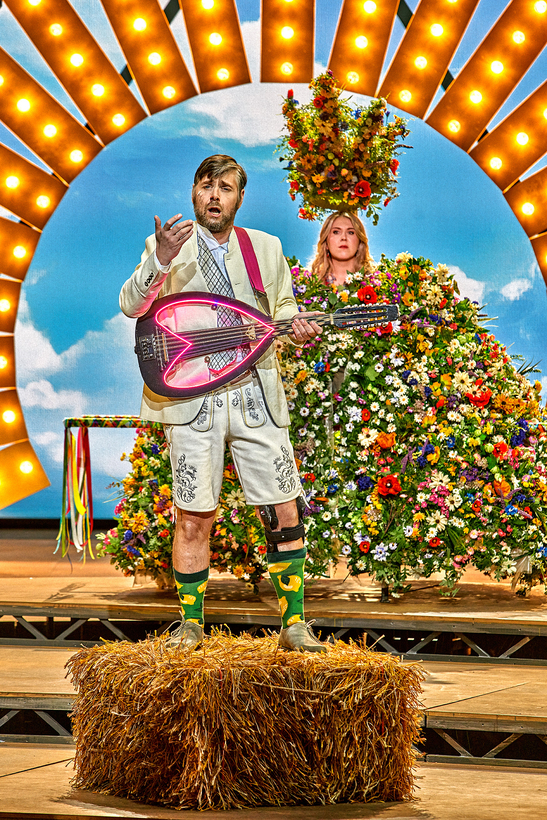How do you stay ahead of the curve when all you do is recycle the same 10 operas year in, year out? Since the premiere of Richard Wagner’s “Ring” cycle in 1876, the Bayreuth Festival—a family fiefdom to this day—has maintained its laser focus on the composer-librettist’s gloomy Romantic mythologies from Der Fliegende Holländer (1843) to the Indian summer blossom of Parsifal (1882). Musically, the impossible dream is to match or exceed the supreme historical standards. But the theatrical mandate since the mid–20th century has been to mix it up—a task these days ritually assigned to stage-directing provocateurs who are not the usual suspects. Streamed live on July 27, it was the sunny midsummer comedy Die Meistersinger von Nürnberg (1868) that came in for this year’s makeover. (Performances at the festival continue through August 22.)
Through the decades, this outlier in the canon has seen its share of brainiac deconstructions on Bayreuth’s “Green Hill,” cuckoo and inspired by turns. This time, the director Matthias Davids, who specializes in the likes of The Witches of Eastwick, Show Boat, Tootsie, and Shrek, served up pure entertainment. With its snappy designs in peppy coloring-book colors, punchy sitcom characterizations, and strategic Oktoberfest touches (lederhosen, pretzels), the show barrels along as good, lite fun.

Faint praise? Well, maybe not that faint. But two performances, revelatory in their distinctive ways, loft the Davids Meistersinger to the heights. Meet the tenor Michael Spyres as Stolzing, a youthful nobleman out to win a burgher’s daughter’s hand by the power of song; and the bass Georg Zeppenfeld as Hans Sachs, a widowed shoemaker well into his prime, who pulls a lot of strings to help Stolzing make it happen.
To oversimplify, but not much, let’s just say that Spyres’s superpowers are his honeyed tones and sheer joy of singing. Stolzing’s crowning “Prize Song,” four hours and a quarter into the video, is meant to blow us away. But where is the tenor who doesn’t fatigue the ear along the way with long patches of sour timbre, pinched top notes, and wooden phrasing? With zero assist from wardrobe or hair and makeup, who get him up like a burly hitchhiker, Spyres delivers rapture all the way through three long acts. When has Stolzing’s music—even his temper tantrums—ever sounded so beautiful?

And Zeppenfeld, so gaunt of feature, so lanky of frame? Against the cathedral resonance of certain paragons of yesteryear (try looking up Friedrich Schorr), his instrument seems lean and his delivery on the “talky” side. Yet his quickness of thought—evidenced in every unforced inflection, gesture, and flicker of facial expression—gives us Sachs in all his Shakespearean layers: sure of himself except when he’s not, generous at heart yet cranky at times, wily when he needs to be, triumphant in the end over the hobgoblins of self-deceiving vanity.
As Eva, the burgher’s daughter whose hand is up for grabs, the radiant, impulsive soprano Christina Nilsson is merely excellent. Likewise, Michael Nagy, hapless but not contemptible as Beckmesser, the stick in the mud who fancies his chances. Invisible in Bayreuth’s famous covered orchestra pit, Daniele Gatti conducts with festive spirit, though the million moving parts of the score once or twice run away from him.
Die Meistersinger von Nürnberg is available for streaming on Deutsche Grammophon’s Stage+ platform
Matthew Gurewitsch writes about opera and classical music for AIR MAIL. He lives in Hawaii

